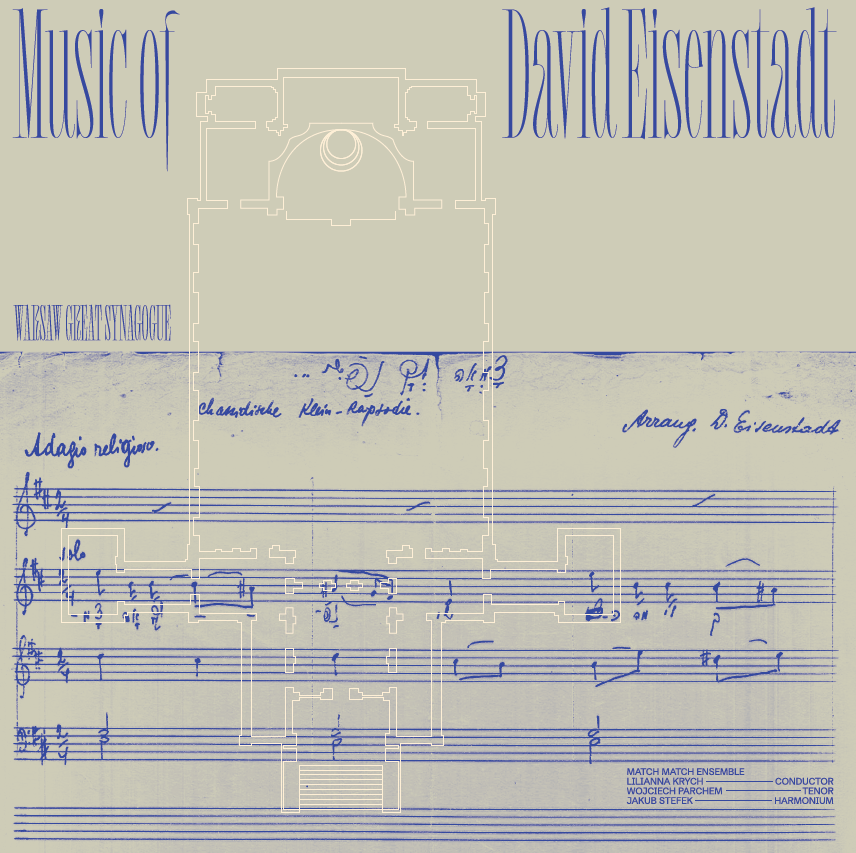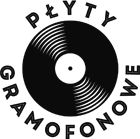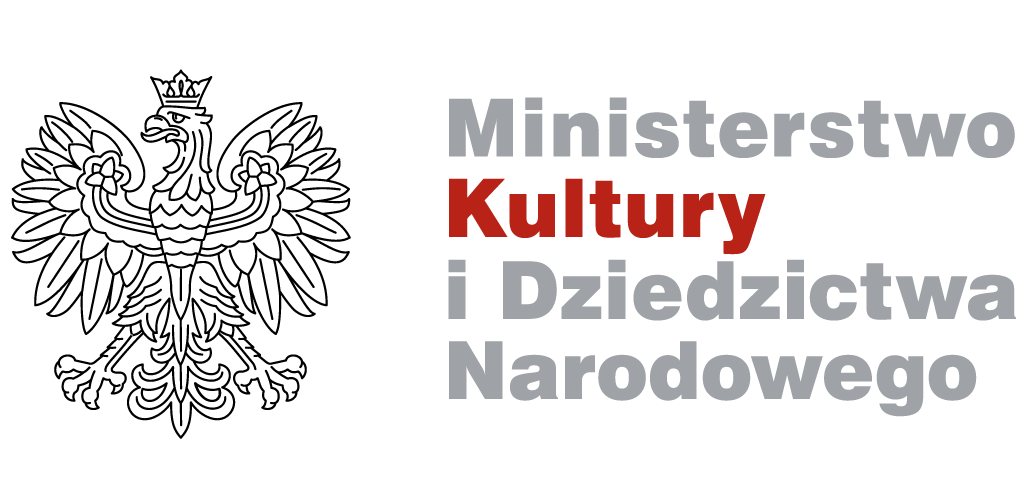
This vinyl recording can be bought online here: płyty gramofonowe.
MUSIC OF DAVID EISENSTADT CHOIRMASTER OF THE GREAT SYNAGOGUE ON TŁOMACKIE STREET
The Great Synagogue on Tłomackie Street in Warsaw was ceremoniously opened on the holiday of Rosh Hashanah in 1878. One of the most beautiful buildings to be constructed in Poland towards the end of the nineteenth century, it soon became the most important spot on the map of Jewish Warsaw. The Synagogue also became famous due to the music that resonated within its walls. The most outstanding cantors of the time worked there. The Synagogue had its own choir, led by excellent directors, which sang to the accompaniment of a harmonium. The Great Synagogue on Tłomackie was blown up by the Germans on 16 May 1943. Its demolition symbolically marked the suppression of the Warsaw Ghetto Uprising and razing the Jewish district to the ground. To this day, the musical tradition has not returned to this place.
An excellent musician, composer and orchestrator, conductor and pedagogue, music writer and author of a popular Jewish encyclopaedia of music – that’s how Professor Marian Fuks described David Eisenstadt. In his books, Prof. Fuks wrote not only about the activity of the Choir of the Great Synagogue on Tłomackie in Warsaw under Eisenstadt’s direction, but also shared his own personal memories of its performances.
David Eisenstadt went down in history as one of the most outstanding in choral art in Poland. The most famous musicians of his time would come to listen to the craftsmanship of his ensemble during both liturgies and secular concerts. Privately, Eisenstadt was described as a tad unpredictable – emotional, joyful, mysterious, mystical, and nonconformist. While working with the Choir, he was reportedly meticulous, paying attention to proper breathing, the multicoloured nature of sound, diction, and performances’ perfection.
Reading about David Eisenstadt and his life journey – from the small town of Nasielsk, through Riga, Vilna, Rostov, and Berlin, all the way to achieving the great fame in Warsaw – made us long for, and then dream of hearing his music again. In every book, every article, every memory, Eisenstadt was presented as the grandest Jewish artist of pre-war Poland. And his music? It was nowhere to be heard in our country. It seemed as if, with the destruction of the Warsaw ghetto by German troops and the murder of the Eisenstadt family – the daughter at Umschlagplatz, David and his wife in the German Nazi camp in Treblinka – the sound of his music was forever lost to us.
And yet, following a persistent search through the archives on three continents, we once again held his music sheet in our hands. We heard again the prayer songs, the perfect recitatives, and also the song titled “Iz avek tsum krig der meylekh” (When the King Went to War) set to the lyrics by Maria Konopnicka, one of Poland’s most eminent writers. Today, with the release of the recording of these pieces, the memory of David Eisenstadt has been filled with essence and affirmed.
In the twentieth century, a vast number of things were destroyed, obliterated, wiped the face of the earth. Today, we demonstrate that it is indeed possible to rebuild, remember, and resurrect them. As we entered the century, it seemed that tragedies witnessed in the twentieth century would never happen again. And yet, people are once again dying before our very own eyes, cities are being destroyed and heritage is turning to dust. By presenting the music of David Eisenstadt, we prove that a revival is indeed possible. For every person who destroys something, there should be someone who rebuilds. Destruction, regardless of whom or of what, must not prevail. We do hope that in the centuries to come, people shall bear that in mind.
David Eisenstadt (1890–1942)
Sh’chulo achulo 4:18
WSZYSTEK ZOSTAŁO SPOŻYTE • ALL HAS BEEN CONSUMED
Shom’oh vatismah tsiyon 4:14
JESZCZE URADUJE SIĘ SYJON • ZION IS YET TO REJOICE
L’eineinu oshku amoleinu 4:49
ZABRALI NAM OWOCE NASZEJ PRACY SPRZED OCZU • THEY STOLE FRUITS OF OUR LABOUR FROM OUR EYES
L’cho dodi 8:08
PRZYJDŹ, MÓJ UKOCHANY • COME, MY BELOVED
Hajom haras olom 2:46
DZIŚ ŚWIAT ZOSTAŁ STWORZONY • TODAY THE WORLD WAS CREATED
Ki lo noeh 3:59
ODPOWIEDNIE TO BOGU • TO GOD IT IS FITTING
Boruch kvod Adonoi 5:00
BŁOGOSŁAWIONY JEST MAJESTAT BOGA • BLESSED IS THE GLORY OF ADONAI
Chassidische Klein – Rapsodie 2:52
MAŁA RAPSODIA CHASYDZKA • LITTLE HASIDIC RHAPSODY
Winterlid 2:24
PIEŚŃ ZIMOWA • WINTER SONG
Iz avek tzum krig der Meilach 6:11
A JAK POSZEDŁ KRÓL NA WOJNĘ • WHEN THE KING WENT TO WAR TEKST • LYRICS M. KONOPNICKA, A. REIZEN
TOTAL TIME: 44:41
ARTISTS:
MATCH MATCH ENSEMBLE Aleksandra Drogosz-Szymańska, Konstancja Molewska, Daria Sawczuk, Adrianna Żołnierczuk-Malec, Małgorzata Bartkowska, Ewa Kijewska, Marzena Lewandowska, Marta Schnura, Andrzej Klepacki, Paweł Kowalewski, Marcin Kuciński, Jakub Prasał, Michał Kijewski, Michał Malec
LILIANNA KRYCH conductor
WOJCIECH PARCHEM tenor
JAKUB STEFEK harmonium
Sound engineering, mastering
ANTONI GRZYMAŁA, AGNIESZKA SZCZEPAŃCZYK
Graphic designer
GABRIELA GOLIŃSKA
Coordination, text
JAKUB STEFEK
Translation
ZOFIA SOCHAŃSKA
Redaction
MACIEJ PRZYBYLSKI
Project manager
KACPER NOWACKI
Production
TOMASZ OLSZEWSKI POLVINYL Sp. z o.o.
The recording was done in the POLIN Museum in Warsaw in 2024.
Financed from the grant from Ministry of Culture and National Heritage from the program „Muzyczny Ślad”.



